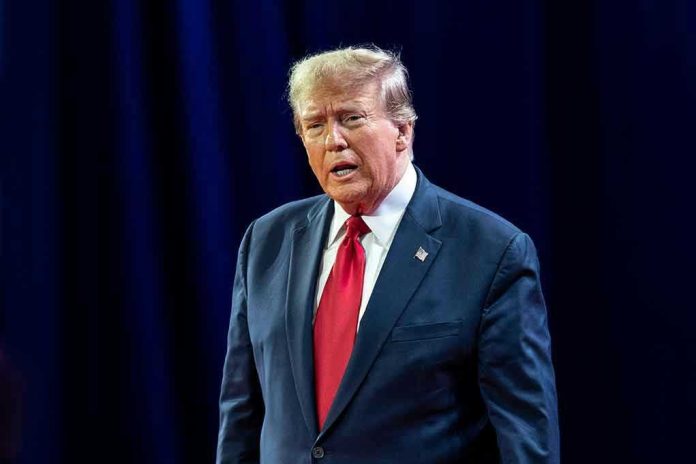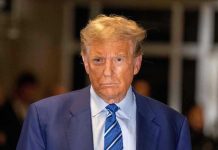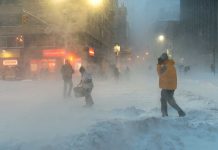
Trump’s own inner circle just shattered his most explosive January 6 conspiracy—leaving the public to wonder: what else about the Capitol riot story is being rewritten from the inside?
Story Snapshot
- Trump claimed 274 FBI agents were “planted” in the crowd before the January 6 riot, fueling suspicions of government-instigated violence.
- Kash Patel—Trump’s own ally—contradicted him, revealing agents arrived only after the riot began for crowd control.
- The timeline Patel provided aligns with official FBI and Congressional records, not Trump’s narrative.
- Deep divisions have emerged within Trump’s camp over the facts and blame for the riot.
Trump’s Claim Collides With His Inner Circle
Donald Trump has never shied away from controversy, but his recent assertion that 274 FBI agents were embedded among Capitol rioters before the chaos erupted is a masterclass in political misdirection. Trump’s claim, delivered with characteristic bravado in September 2025, was not just a swipe at federal law enforcement—it was a direct challenge to the accepted timeline of January 6. For years, Trump has pushed narratives that shift blame away from his supporters, but this particular allegation struck a nerve, not least because it was immediately torpedoed by one of his closest allies.
Kash Patel, who served as a senior Trump official and remains a vocal critic of FBI leadership, stunned observers by publicly disputing Trump’s timeline. Patel clarified that FBI agents were not present in the crowd prior to the riot; instead, he explained, they were deployed for crowd control only after violence had begun. This wasn’t just a minor correction—it was a direct refutation broadcast to the world, undermining Trump’s attempt to recast the riot’s origins and the FBI’s role. Patel’s candor exposed a rare fissure inside Trump’s camp, adding fresh complexity to the ongoing debate over January 6.
Inside the Divided Narrative
The January 6 riot has remained a flashpoint for American politics, with conspiracy theories fermenting long after the last protestor left the Capitol steps. Trump’s latest claim represented a dramatic escalation, asserting not only that federal agents were present, but that they may have stoked the violence. Patel’s intervention was more than a rebuttal—it was a reality check for anyone following the saga. He criticized the FBI’s post-riot deployment for violating established protocols but refused to play into Trump’s story of premeditated agent provocateurs. Patel’s stance, especially given his proximity to Trump, forced even die-hard supporters to reconsider the facts.
Official records back Patel’s version of events. FBI Director Christopher Wray has repeatedly testified before Congress that no agents or informants were embedded in the crowd before the riot. Congressional investigators and law enforcement experts have echoed this, noting the absence of credible evidence for Trump’s timeline. Still, Trump doubled down, accusing Wray of “lying to Congress” and calling for prosecution—a move that only deepened the political divide and kept the controversy alive in the public eye.
The Fallout and Ripple Effects
These revelations have had swift and sweeping consequences. In the short term, Trump’s claim—and its refutation by Patel—has intensified scrutiny of FBI leadership and protocol. Congressional committees continue to probe the agency’s actions, while whistleblower disclosures stoke further debate about transparency. The long-term impact could be even more profound: calls for reform within federal law enforcement, new demands for accountability, and a deepening polarization over what really happened on January 6.
Public trust in federal agencies is already fragile, and stories like this threaten to erode it further. Trump supporters remain skeptical of official accounts, amplifying conspiracy theories and casting doubt on every new disclosure. Meanwhile, mainstream investigators and experts urge the public to rely on documented timelines and sworn testimony. The battle for truth is being waged not just in the halls of Congress, but across social media and cable news, with every statement and counterstatement adding another layer to the saga.
Expert Analysis and the Road Ahead
Law enforcement experts and Congressional investigators overwhelmingly reject Trump’s claim, pointing to a lack of evidence and the consistency of official timelines. Patel’s clarification carries particular weight, given his prior role in the administration and reputation for whistleblower advocacy. Analysts argue that the real danger lies in the persistence of misinformation, which undermines both institutional integrity and public confidence.
Academic observers note that stories like these are symptomatic of a broader trend: political figures seeking to rewrite history for personal gain. The January 6 narrative remains contested ground, and every new twist—especially when it comes from within Trump’s own circle—has the potential to reshape public perception. As investigations continue and new disclosures emerge, Americans are left with a lingering question: who benefits from these conflicting stories, and what does the truth mean for the future of law enforcement and democracy?
Sources:
Kash Patel Contradicts Donald Trump’s Claim About FBI on January 6
Kash Patel denies Trump rant that FBI agents incited Jan 6 riots: ‘Crowd control mission’



